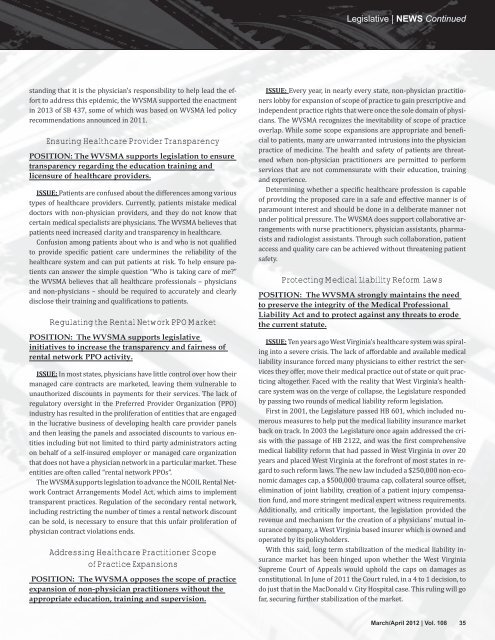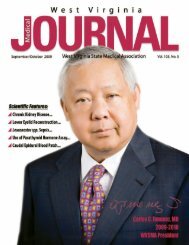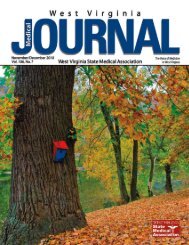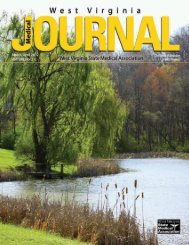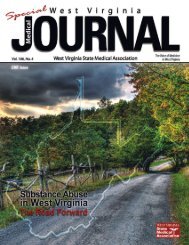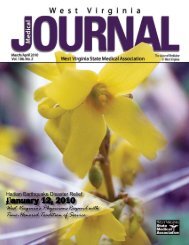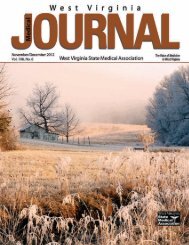March/April - West Virginia State Medical Association
March/April - West Virginia State Medical Association
March/April - West Virginia State Medical Association
Create successful ePaper yourself
Turn your PDF publications into a flip-book with our unique Google optimized e-Paper software.
Legislative | News Continued<br />
standing that it is the physician’s responsibility to help lead the effort<br />
to address this epidemic, the WVSMA supported the enactment<br />
in 2013 of SB 437, some of which was based on WVSMA led policy<br />
recommendations announced in 2011.<br />
Ensuring Healthcare Provider Transparency<br />
POSITION: The WVSMA supports legislation to ensure<br />
transparency regarding the education training and<br />
licensure of healthcare providers.<br />
ISSUE: Patients are confused about the differences among various<br />
types of healthcare providers. Currently, patients mistake medical<br />
doctors with non-physician providers, and they do not know that<br />
certain medical specialists are physicians. The WVSMA believes that<br />
patients need increased clarity and transparency in healthcare.<br />
Confusion among patients about who is and who is not qualified<br />
to provide specific patient care undermines the reliability of the<br />
healthcare system and can put patients at risk. To help ensure patients<br />
can answer the simple question “Who is taking care of me?”<br />
the WVSMA believes that all healthcare professionals – physicians<br />
and non-physicians – should be required to accurately and clearly<br />
disclose their training and qualifications to patients.<br />
Regulating the Rental Network PPO Market<br />
POSITION: The WVSMA supports legislative<br />
initiatives to increase the transparency and fairness of<br />
rental network PPO activity.<br />
ISSUE: In most states, physicians have little control over how their<br />
managed care contracts are marketed, leaving them vulnerable to<br />
unauthorized discounts in payments for their services. The lack of<br />
regulatory oversight in the Preferred Provider Organization (PPO)<br />
industry has resulted in the proliferation of entities that are engaged<br />
in the lucrative business of developing health care provider panels<br />
and then leasing the panels and associated discounts to various entities<br />
including but not limited to third party administrators acting<br />
on behalf of a self-insured employer or managed care organization<br />
that does not have a physician network in a particular market. These<br />
entities are often called “rental network PPOs”.<br />
The WVSMA supports legislation to advance the NCOIL Rental Network<br />
Contract Arrangements Model Act, which aims to implement<br />
transparent practices. Regulation of the secondary rental network,<br />
including restricting the number of times a rental network discount<br />
can be sold, is necessary to ensure that this unfair proliferation of<br />
physician contract violations ends.<br />
Addressing Healthcare Practitioner Scope<br />
of Practice Expansions<br />
POSITION: The WVSMA opposes the scope of practice<br />
expansion of non-physician practitioners without the<br />
appropriate education, training and supervision.<br />
ISSUE: Every year, in nearly every state, non-physician practitioners<br />
lobby for expansion of scope of practice to gain prescriptive and<br />
independent practice rights that were once the sole domain of physicians.<br />
The WVSMA recognizes the inevitability of scope of practice<br />
overlap. While some scope expansions are appropriate and beneficial<br />
to patients, many are unwarranted intrusions into the physician<br />
practice of medicine. The health and safety of patients are threatened<br />
when non-physician practitioners are permitted to perform<br />
services that are not commensurate with their education, training<br />
and experience.<br />
Determining whether a specific healthcare profession is capable<br />
of providing the proposed care in a safe and effective manner is of<br />
paramount interest and should be done in a deliberate manner not<br />
under political pressure. The WVSMA does support collaborative arrangements<br />
with nurse practitioners, physician assistants, pharmacists<br />
and radiologist assistants. Through such collaboration, patient<br />
access and quality care can be achieved without threatening patient<br />
safety.<br />
Protecting <strong>Medical</strong> Liability Reform Laws<br />
POSITION: The WVSMA strongly maintains the need<br />
to preserve the integrity of the <strong>Medical</strong> Professional<br />
Liability Act and to protect against any threats to erode<br />
the current statute.<br />
ISSUE: Ten years ago <strong>West</strong> <strong>Virginia</strong>’s healthcare system was spiraling<br />
into a severe crisis. The lack of affordable and available medical<br />
liability insurance forced many physicians to either restrict the services<br />
they offer, move their medical practice out of state or quit practicing<br />
altogether. Faced with the reality that <strong>West</strong> <strong>Virginia</strong>’s healthcare<br />
system was on the verge of collapse, the Legislature responded<br />
by passing two rounds of medical liability reform legislation.<br />
First in 2001, the Legislature passed HB 601, which included numerous<br />
measures to help put the medical liability insurance market<br />
back on track. In 2003 the Legislature once again addressed the crisis<br />
with the passage of HB 2122, and was the first comprehensive<br />
medical liability reform that had passed in <strong>West</strong> <strong>Virginia</strong> in over 20<br />
years and placed <strong>West</strong> <strong>Virginia</strong> at the forefront of most states in regard<br />
to such reform laws. The new law included a $250,000 non-economic<br />
damages cap, a $500,000 trauma cap, collateral source offset,<br />
elimination of joint liability, creation of a patient injury compensation<br />
fund, and more stringent medical expert witness requirements.<br />
Additionally, and critically important, the legislation provided the<br />
revenue and mechanism for the creation of a physicians’ mutual insurance<br />
company, a <strong>West</strong> <strong>Virginia</strong> based insurer which is owned and<br />
operated by its policyholders.<br />
With this said, long term stabilization of the medical liability insurance<br />
market has been hinged upon whether the <strong>West</strong> <strong>Virginia</strong><br />
Supreme Court of Appeals would uphold the caps on damages as<br />
constitutional. In June of 2011 the Court ruled, in a 4 to 1 decision, to<br />
do just that in the MacDonald v. City Hospital case. This ruling will go<br />
far, securing further stabilization of the market.<br />
<strong>March</strong>/<strong>April</strong> 2012 | Vol. 108 35


